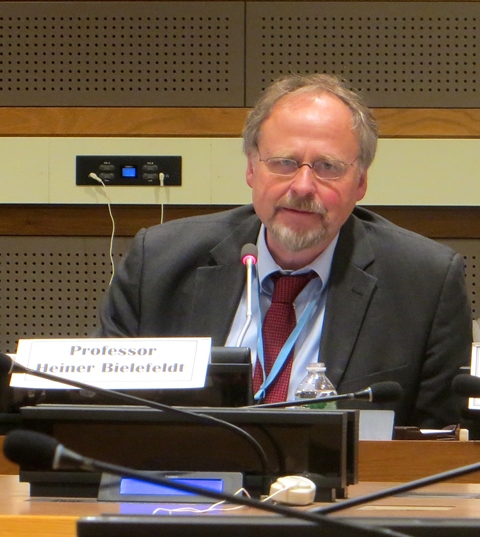Freedom of Religion Is Topic of UN Side Event, October 2014

Report by Laurie Williams Sowby, Deseret News, October 31
It began with a Jewish piano teacher who was dismissed from her job at a European music conservatory because she refused to give exams on Saturdays, the day she honored as the Sabbath. When he heard of the case, Professor Heiner Bielefeldt knew religious freedom in the workplace was an issue he wanted to pursue. Dr. Bielefeldt, human rights professor at the University of Erlangen-Nürnburg in Germany, was appointed as U.N. Special Rapporteur on Freedom of Religion or Belief in 2010 with a three-year renewal of his appointment in 2013. He presented his report at the United Nations Oct. 23 and headed panels on the topic Oct. 23 and 24 in New York.
The U.N. side event on Oct. 24, co-hosted by the United Kingdom and BYU’s International Center for Law and Religion Studies, featured several noted authorities in the field. The session was attended by 60 people, including diplomats from missions to the U.N. and representatives from non-governmental agencies interested in fostering religious freedom globally.
W. Cole Durham Jr., who heads BYU’s International Center for Law and Religion Studies, assembled the panel of experts. The interactive session responding to Dr. Bielefeldt’s report on religious freedom in the workplace was moderated by Peter Wilson, CMG, Ambassador and Deputy Permanent Representative for the U.K. Mission to the United Nations. He explained that the workplace must be included as part of a person’s life and identity, as far as definitions of human rights go.
Although religious freedom is one of the oldest mandates in the U.N., Dr. Bielefeldt said it has not received as much attention as many other mandates, and more needs to be done to prevent and eliminate religious intolerance and discrimination in the workplace. Employers should “generally understand religious tolerance and diversity as a positive asset and important part of their corporate identity.”
“Equality is not sameness,” he emphasized. “It means equal respect for people’s beliefs.”
He and other panelists encouraged “reasonable accommodation” on the part of employers, including areas of religious dress, practice and holidays. “In the context of human rights,” he said, “equality must always be conceived of as diversity-friendly equality, which is the opposite of ‘sameness’ or uniformity.”
Lucy Vickers, a professor of law at Oxford Brookes University in England, noted that work is not a private space and, at times, becomes a place of both direct and indirect religious discrimination.
Todd R. McFarland, associate general counsel for the General Conference of Seventh-day Adventists, echoed the sentiment, saying people should not have to “choose between living their religion and making a living.” He continued, “Equality doesn’t mean sameness. It means you treat people as individuals.”
Recognizing that religion and belief are an integral part of every human being, Richard Foltin, director of the American Jewish Committee’s National and Legislative Affairs, put it this way: “We cannot expect people to leave their religion at the door of the workplace.”
Panelists agreed with Dr. Bielefeldt’s recommendations and urged the international human rights community to take religious freedom seriously. “This report was a step forward to strengthen this position on the ground,” said Dr. Peter Petkoff, who leads the Religion, Law, and International Relations Programme of Regent’s Park College in Oxford, England.
Translating ideas into practice is the next step. Katie Alidade, Ph.D. candidate at Catholic University of Leuven, in Belgium, was a key researcher in the Religare project, which studied cases of religious discrimination in the workplace in 10 European countries. Rather than see religion or belief as an exception, her report recommended employers need to adopt policies of “inclusive neutrality.”
BYU’s Professor Durham said Dr. Bielefeldt’s report “helps to remind us that we live in a world with deep difference, in which peace can only be grounded on an obligation to respect everyone else’s existential choices, within the limits of optimal equal liberty for all.”
In a question-and-answer session, he encouraged the support of faith and belief throughout the world, saying, “Some of our greatest good has been accomplished by people who asserted their conscience.”